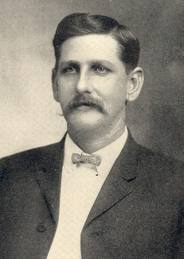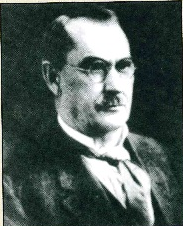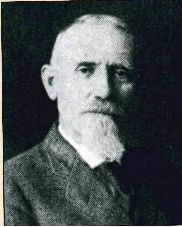Former Sheriffs from 1880-1914
| Walter T. Maddox 1880-1886 |
|
Walter T. Maddox was born in Georgia in 1844 and grew up on a Louisiana plantation. His father was a Colonel and a Confederate hero of the Louisiana 17th Infantry. Although a schoolboy, Maddox enlisted in the Fifth Louisiana Cavalry. He saw service on the Red River front and at one point went ten days and nights without removing the saddle from his horse. In 1873, Maddox moved to Fort Worth where he ran a livery stable for eight years. Fort Worth had a Volunteer Fire Department in the early years where Maddox served as a Fire Chief. In 1880 Maddox was elected Sheriff of Tarrant County. He was re-elected twice – serving six years as the Sheriff. It was during Sheriff Maddox’s watch in 1886 when Deputy R.W. (Dick) Townsend was shot and killed during an infamous railroad strike. In 1887 Maddox became a partner in Ellison and Company, dealers in furniture and undertaker supplies before the turn of the century. Maddox’s firm was one of only two wholesale furniture companies in Texas.
|
|
| Ben H. Shipp 1886-1888 |
|
Ben H. Shipp was elected on November 2, 1886. While little is known about Shipp individually, he was Sheriff during one of the most famous tales of Fort Worth and Tarrant County history. The story purports Timothy “Longhair Jim” Courtright was extremely popular in Fort Worth, even after leaving office as the Fort Worth City Marshal. Courtright, described as working both sides of the law, was also a gambler, private detective and known gunfighter. Luke Short owned the gambling concession at the White Elephant Saloon, which at that time was located at 308-310 Main Street. Short’s reputation as a gunfighter was on a par with that of Courtwright. In Leadville, Colorado, Short had killed a local villain in a celebrated gunfight. In Tombstone, Arizona, he faced and killed well-known gunman Charley Storms. He also worked in Dodge City, Kansas, in a gambling ring protected by Wyatt Earp and Bat Masterson. The story goes that on February 25, 1881, Jake Johnson, who was a partner of Luke Short, was talking to Courtright on the sidewalk in front of The White Elephant. A disagreement lead Johnson to summon Luke Short outside. The three men walked about half a block and stood talking in front of Ella Blackwell’s Shooting Gallery. While the three men talked, Courtright’s thumbs were hooked in the armholes of his vest. Courtright lowered his hands suddenly and said, “Don’t pull any gun on me”. Short said, “I have no gun there,” making a movement as if to pull up his vest. At this gesture, Courtright went for his gun. Courtright’s gun cleared his holster before Short got his weapon out, but it did little good. Short drew and discharged his Colt .45 caliber single action revolver, striking Courtright in the body. Short fired four additional times in quick succession – each round staggering the bigger man and knocking him backwards through the door of the Shooting Gallery. Courtright dropped to the floor, having never gotten off a shot. Sheriff B. H. Shipp and City Marshal Rea immediately showed up at the scene. A crowd had gathered, and based upon their rumblings, Sheriff Shipp arrested Short on the scene and took him to the County Jail. Two other officers joined the Sheriff and Marshal and the four persuaded the crowd to keep their distance. Sheriff Shipp decided to let the Magistrate straighten things out the next morning. It was reported the crowd was getting hostile in spite of the steady decline in Courtright’s reputation in recent years. Enough doubt existed on the matter of Short’s safety in the County Jail that his old friend, Bat Masterson, was allowed to spend the night in the next cell armed with a pair of pistols. Masterson even convinced Sheriff Shipp that prisoner Luke Short should also have a pair of pistols in case a lynch mob showed up.
|
|
| J.C. Richardson 1888-1892 |
|
J.C. Richardson was born October 21, 1838 in Lewis, Missouri. Richardson enlisted in the Confederate Army on September 1, 1862 at Camp Mitchell as a Sergeant, Company A, Steen’s Regiment, Missouri Volunteers. He was captured July 4, 1863 at Helena, Arkansas and transferred to a number of camps as a prisoner of war. Richardson was paroled or exchanged October 7, 1864 in New Orleans, Louisiana on June 8, 1865. Historical documents indicate he had a number of brothers who also served. Sometime after the Civil War, John Richardson and his wife, Sarah Margaret (Hardman) Richardson had moved to Fort Worth, Texas, where Richardson became a cattle dealer. John Richardson is constantly referred in historical documents as “Captain” Richardson. He was the founder and organizer of the first Confederate Veteran Post in Fort Worth. He served for years as the head of the organization, which probably lead to the title “Captain Richardson”. Sheriff Richardson was elected in 1888 and served two terms ending in 1892. As Sheriff, Richardson officiated over a number of executions while in office. Sheriff Richardson and his wife had one daughter, Maude, who married Dr. E. Bryce Osborne in 1896. Maude was the manager of the Y.W.C.A. Home for Girls in Fort Worth. The family lived at 1201 West Fifty Street. Captain John Richardson died on October 6, 1914 and is buried in Greenwood Cemetery. Sheriff Richardson was a member of the Woodsmen of the World.
|
|
| E.A. Euliss 1892-1896 |
|
E.A. Euliss was born September 26, 1848 in Bedford County, Tennessee. Initially he moved from Tennessee to the Grapevine area. Shortly afterward, he moved a few miles west, naming the new place “Euless.” Euliss farmed and ran a cotton gin until 1892. His first public office was Constable of Precinct No. 3 in 1876. His first run for Sheriff was in 1880, but he lost the nomination for the Democratic Party. Although he lost, he worked very hard for his one time-opponent, Walter T. Maddox, who was elected to the office. He ran again in 1892, defeating three strong competitors and was elected by a majority of 934 votes. Sheriff Euliss was so successful that the party re-nominated him for the office in 1894. In a hard-fought campaign, he won by 800 votes. Sheriff Elisha Adams Euliss built his reputation around the act of treating friend and foe alike. History reveals he was held in high esteem by most of the citizens of Tarrant County.
|
|
| Sterling Price Clark 1896-1902 |
|
Sterling P. Clark was born December 1, 1861 in Smithfield, Tarrant County (present day North Richland Hills). Clark’s father, a very decorated Confederate veteran, had returned from the Civil War and named his last-born child after his General of the Confederate States of America, Sterling Price. Private family writings reveal Indians chased down Sheriff Clark’s father near Blue Mound Road where he eventually was able to escape. Clark was educated at home where he also received and possessed a great deal of practical knowledge and experience. At 21 years of age, he opened a drug store in Keller and soon discovered he preferred outdoor life. As a result, he returned to raising cattle. He was once the Vice President of the North Texas Livestock Commission Company. In addition, he was a member of the Panhandle Cattle Raisers Association and the Texas Cattle Raiser’s Association. Records also show he was the Assistant General Manager of Cassidy South Western Livestock Commission Company. Clark was a Deputy Sheriff for a number of years serving under Captain J.C. Richardson and Sheriff Ben H. Shipp. Like many of the previous Sheriffs, his first bid for the office was unsuccessful. It was 1896 when he took the title of Sheriff and designated “Hangman” for the convicted felons of Tarrant County. Several years later in 1909, following his duties as Sheriff, he scheduled the execution of a man who robbed a train in Saginaw. The Sheriff also proposed marriage to Sophia Moore Putnam. It is reported the wedding was postponed because she refused to go through with it if Sheriff Clark was going to spring the death trap. His resolution for keeping his bride and performing his duties lead Sheriff Clark to the decision of simply presiding over the execution and assigning a Deputy to spring the trap. Sheriff Clark was re-elected in the years 1898 and 1900, finishing his first run as Sheriff in 1902. He was re elected to his final term in 1918 and served until November 2, 1920. He was an early President of the Texas Sheriff’s Association. During his last term in 1918, he took part in a roundup of a notorious gang of confidence men with his life long friend, J. Frank Norfleet. Sheriff Clark trailed the men for years and went to California to bring two back to Tarrant County to stand trial. Like the Northwest Mounted Police, he had a reputation for always getting his man. Though never forced to shoot anyone, he was shot on a number of occasions. Stories about Sheriff Clark reveal a bullet once crashed through a window of his home as he sat with his family eating dinner. Sheriff Clark allegedly received threats by mail every Christmas from Huntsville from a man sentenced to life. The prisoner would send a carved piece of wood or some other trinket with the concealed message “I’ll get you yet.” Clark established Sterling P. Clark Dry Goods Company, which later became Meacham’s. In his last busy years, he was in the real estate business. He was a Mason, a Woodsman and a Pythian. At 81 and retired for one year, he was mentally active until a few hours before his death. The night before his death, he was at his home talking with a friend about a real estate deal. Suffering from pneumonia, he was taken to a hospital and died in 1942.
|
|
| John T. Honea 1902-1906 |
|
John T. Honea was born in the City of McKenzie, Carroll County, Tennessee in 1864. His father was a doctor. Honea first came to Texas when he was 14 traveling to Clarksville, Weatherford and returning to Tennessee. In 1884, he came back to Texas and by 1890, was a resident of Arlington. John T. Honea served as the Constable of Arlington and the City Marshal during a time when Arlington was noted for being a “tough place.” Mr. Honea is credited for improving the crime situation in Arlington. In 1896, he became a Tarrant County Deputy Sheriff under Sterling P. Clark for two years, and returned to being constable for another two years. Sheriff Honea was cited as being the only Tarrant County Sheriff who never had a damage suit filed against him or his staff. Sheriff Honea was further distinguished for shutting down most, if not all, gambling in the city of Fort Worth. Mr. Honea was a member of the Board of Trade, the Woodsmen, the Red Men and the Eagles. He ran for re-election in 1922 and lost. In 1923, he was indicted by a Federal Grand Jury in an oil fraud speculation scheme.
|
|
| Tom J. Wood 1906-1909 |
|
It is reported that Sheriff Thomas “Tom” J. Wood was born in 1860 and his family came to the Handley community of Tarrant County in 1874 from Randolph County, Alabama. Sheriff Tom Wood worked most of his life as a farmer and he was very active in the local community. Due to his outstanding moral character, several leading citizens of Tarrant County persuaded him to run in the 1906 Sheriff’s election, which he won. Although Sheriff Wood was plagued by an unspecified illness during much of his tenure, he worked diligently to fulfill the duties of his office. During his three-year career as the chief law enforcement officer of Tarrant County, Sheriff Wood obtained the respect of local citizens and leaders by treating everyone fairly and dramatically improved the efficiency of collecting fees for his office. Sheriff Tom Wood easily won re-election in 1908 by a wide margin, but it was evident that his illness was causing him considerable pain. On March 11, 1909, Sheriff Tom Wood died of the illness that plagued him for over eighteen months. Although everyone had long feared the possibility of his death, it still came as a shock to many citizens. There was a tremendous outpouring of genuine grief and support for the very popular Sheriff. On the day of his funeral, all County government offices and many businesses in Fort Worth were closed. In addition, several local business leaders, political leaders, citizens and a District Court Judge joined together and petitioned the Tarrant County Commissioners Court to appoint the wife of Sheriff Wood as acting Sheriff until the 1910 election. The petition stated Mrs. Wood would carry out the official functions of the office and reserve the skilled staff, assembled by Sheriff Wood, to handle the “un” ladylike work. The movement to appoint Mrs. Wood as Sheriff is even more amazing, based on the fact that women in the United States were not given the Constitutional right to vote for almost another ten years. The Tarrant County Commissioners Court held its session on March 13, 1909 to select an individual to serve the unexpired term of Sheriff Wood. After at least seven rounds of ballots and much debate, the Commissioners Court could not obtain a majority vote for the selection of the new Sheriff. Several of the Commissioners were not comfortable with the idea of a “woman” being selected as Sheriff of the county. The Tarrant County Commissioners Court finally selected former Tarrant County Commissioner O.L. Sweet to fill the unexpired term of Sheriff Wood. Many citizens of Tarrant County were dismayed by this selection. Since O.L. Sweet had served as County Commissioner with most of the current members, it was widely believed that a secret deal had been made between Sweet and the County Commissioners. When he took office, Sheriff Sweet promised to make very few changes to his department, but he promptly dismissed several of his deputies and jailers.
|
|
| O.L. Sweet 1909-1910 |
|
Orlando Lorenzo Sweet was born on December 13, 1857 in Pike County, Illinois. He worked on a farm there until he purchased a farm in Tarrant County in 1873. Sweet continued to farm and raise cattle, even while holding public offices. In 1906, O.L. Sweet was elected County Commissioner in Tarrant County. In March, 1909, Sheriff Tom J. Wood died in office. Sweet was also appointed to fill the unexpired term of Sheriff. He was a member of the Texas Legislature for four years and initiated a number of bills. Sweet was also influential in the building of colleges and educational institutions in Fort Worth. Sweet was a member of the A.F. and A.M., the Woodsmen of the World. He was chairman of the prohibition forces of Tarrant County. As a member of the State Democratic Convention, he was active throughout the campaign of President Woodrow Wilson. He was also a member of the Texas Legislature at the time of his death on July 2, 1923.
|
|
| W.M. Rea 1910-1914 |
|
William Rea was born in Knox County, Illinois on June 10, 1850. In 1859, the family moved to a farm near the location known today as Mansfield. In 1878, W.M. Rea moved to Fort Worth proper. He became a policeman under City Marshal Longhaired Jim Courtright that same year. Rea was in Patrol until 1883 when he was elected City Marshal. City Marshal Rea was re-elected in April 1885 and in 1889. It was after his term expired when Sheriff Ben H. Shipp appointed him Deputy Sheriff. W. M. Rea was a Deputy throughout Ben Shipps’ administration and was appointed Chief Deputy by Sheriff (Captain) J.C. Richardson. In 1892, Sheriff Euliss also made Rea his Chief Deputy. By 1900, the position of City Marshal had been changed to Chief of Police and became an elected position. Rea had been re-elected City Marshal in 1889 and was elected Chief of Police in 1901. Rea was elected Sheriff of Tarrant County on November 8, 1910, re-elected November 5, 1912 and served until November 3, 1914. In 1901, he advocated a separate justice system for juveniles and adults. Rea had the insight and ability to recognize that by separating child offenders from adults, the youngsters might be salvaged as productive members of society. Sheriff/Chief of Police William M. Rea died on May 30, 1933 and is buried in Oakwood Cemetery in Fort Worth.
|


 TARRANT COUNTY, TX
TARRANT COUNTY, TX

 Sheriff's Office
Sheriff's Office


